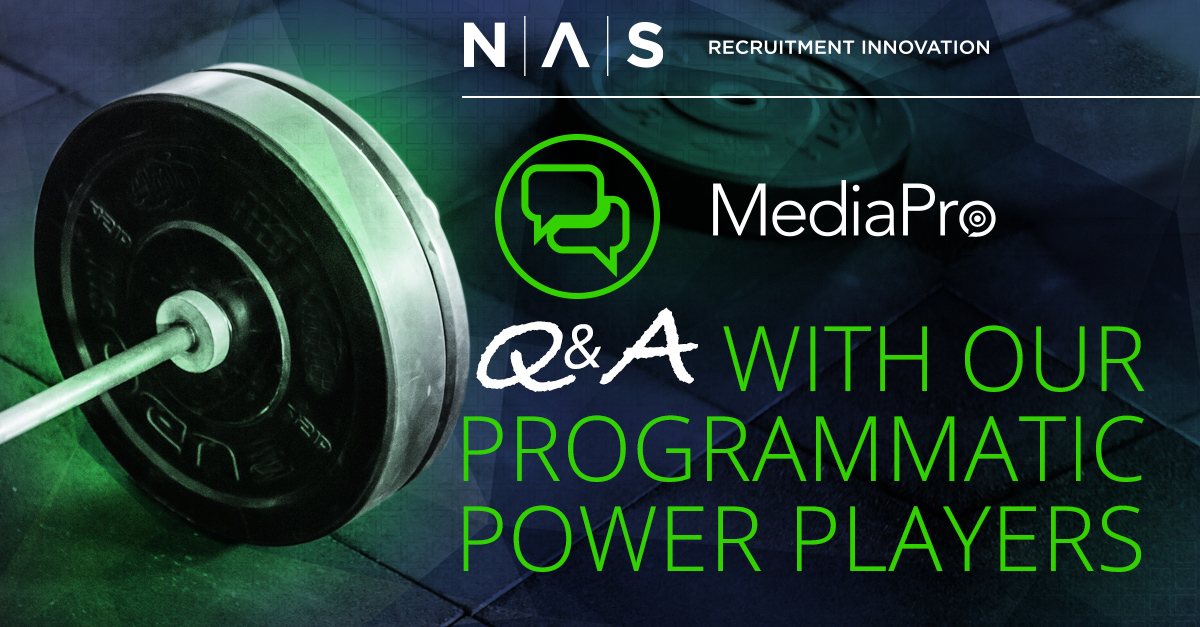-
Q&A with our Programmatic Power Players
Posted by NAS Recruitment Innovation on February 7th, 2019 
Programmatic advertising has been one of the most talked-about areas of recruitment marketing in the past year. Our NAS MediaPro offering has been adopted by a large number of our clients, with great success, which gives us a lot of insight into the process, the progress and the performance of programmatic.
Jennifer Henley (Vice President of Client Services) and Chris Knott (Account Director) recently spoke with AppCast about some of the rewards and challenges of programmatic advertising as part of an e-book they are preparing. We decided to share some of the wide-ranging conversation on NAS Talent Talk.
How would you describe programmatic advertising to recruitment professionals?
Chris Knott: When I discuss programmatic with clients, the word that comes to mind is evolution. To me, it’s the evolution of the PPC media strategy to a programmatic media strategy. It’s the best way to manage an active candidate strategy, it’s what’s NOW and it will only continue to evolve.
Jennifer Henley: When I think of programmatic I think: simple and effective. Those are two keywords that come to mind for me. I know there’s a lot happening in the background and it’s technology-driven, but when I think about what it will do for you – it will simplify your process, and you will be more effective – the benefits are obvious and transparent.
What are some of the challenges you’ve encountered in this new age of recruitment advertising and programmatic technology?
Jenn: With programmatic specifically, it’s trying to sell it, not tell it. Often times we’re so focused on educating that it becomes a tactical discussion; the purpose almost seems to get lost. You need to step back and highlight the key differentiators such as diversification of publishers, nimble budgets and true Cost per Applicant metrics (not just Cost per Click).
It’s a change of strategy, not just a change of partner, and I think that’s a challenge because you have recruiters in different industries who have varying levels of knowledge and expertise. You have to really bring them over to understand programmatic in a way that makes sense to them, like “Yes, your applications went from 4,000 to 2,800, but your acceptance rate is 91%, which is up from 60%, and you didn’t pay for 2,200 applications that you didn’t need.” It’s about looking at your metrics a little differently. You don’t need that big pot of people. You need quality, and ultimately, that’s why choosing programmatic is important.
Chris: Programmatic is really about targeting the active job seeker. A lot of clients tend to focus on finding passive candidates and finding those secret pockets where people are. But the vast majority of the people who are going to apply, and who you’re going to hire through media, are going to be active job seekers.
How has programmatic improved your daily operations and your interactions with clients?
Jenn: I would say we have richer, more meaningful conversations. There’s a level of expectation we’ve fostered among clients when we say “We’re an extension of your team.” We manage their budget and they really lean on us to make sure we’re interpreting the data and level-setting, and making sure that we’re being accountable for results.
As we know, an organization’s employer brand and candidate experience can have a great impact on the effectiveness of its recruitment media. How are you consulting clients in these areas?
Chris: The one thing I would advise a client is to develop a messaging strategy that focuses on your employer brand and the transparency of your employer brand, because I think that’s the key element that candidates are looking for now. Yes, they want to find your jobs, but the majority of candidates are going to research your company, and they’re going to find out not just what you’re saying about you, but also what people who work there now and who have worked there in the past are saying about you.
So, developing a messaging strategy is key, and that messaging strategy lives everywhere—
on your job postings, on your career site and within your social channels. Any touchpoint that potential candidates are going to experience, you need to be cognizant of and paying attention to, and either managing or participating in.Tell me about your agency. What sets you apart?
Jenn: When I think of NAS – innovation is a big part of it, but we’re also creators and storytellers. We’re a lot of things and we have to be. We have to evolve. We’re a 70-year company. We’ve had bumps and bruises. Over the years, we’ve gotten fat and we’ve gotten thin – and how we stay innovative is that we’re pushed. We’re pushed by our clients, we’re pushed by our partners and our people.
We’re nimble to try, accept, and do. Some of that may fail, but we won’t fail. Recruitment marketing is so different, even in the 19 years that I’ve done it, much less 70 years. Just staying on top of that as best as you can and being open-minded and thoughtful and having the resources and support to try different approaches and bring new things to market is important.
Chris: I would add that we’re very client-focused and we still believe in the human element. I think this is also part of innovation, because it’s a lost art. So, we’re not trying to sell you a subscription to a technology, and we want to set it up and leave it alone. We are still involved and we’re full-service and that’s the human element – there’s no tech solution for something like that.
This is still human resources, and we’re still hiring humans. Technology is important and it’s very powerful, but we realize that having that personal, one-on-one contact is very important to clients and a big part of NAS. I think a lot of companies have lost that.
For further information, read our recent blog posts about programmatic:
Programmatic Power Plays (case studies)
Gain the Power of Programmatic
NAS Recruitment Innovation


